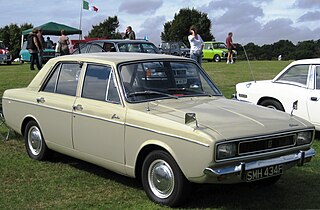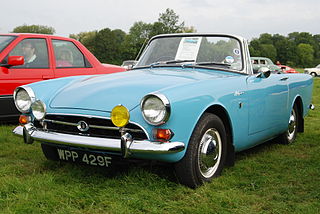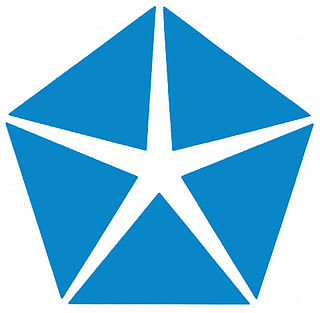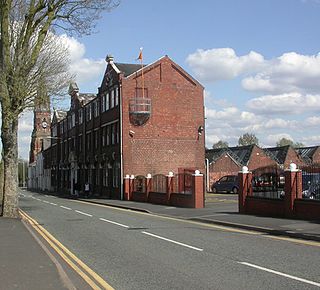British Light Steel Pressings Ltd was a company at Warple Way, Acton, London producing bodies for the vehicle industry.

Acton is an area of west London, England, within the London Borough of Ealing. It is 6.1 miles (10 km) west of Charing Cross. It lies within the Historic County of Middlesex.
British Light Steel Pressings Ltd (BLSP) was formed in 1930. In its early years it made pressings for various purposes. In 1937 it was taken over by the Rootes Group, to make body shells for Sunbeam cars. After World War II, despite transfer of production of Sunbeam-Talbots from the old London Talbot factory to a new government funded site at Ryton, BLSP continued in production. In 1948, for example, versions of the Sunbeam-Talbot 80 and 90 were available with saloon bodywork from BLSP or drophead coupé bodywork by another nearby Rootes company, Thrupp & Maberly. [1] During the mid-1950s car bodies produced included the Sunbeam Mk III saloon and convertible, Sunbeam Alpine (1953–55) and thereafter the Humber Hawk, Super Snipe and Imperial in saloon and estate car versions. BLSP Ltd ran a successful apprenticeship scheme covering both professional engineering and trade programmes.

The Rootes Group or Rootes Motors Limited was a British automobile manufacturer and, separately a major motor distributors and dealers business. Run from London's West End, they were respectively based in the Midlands and south of England. In the decade beginning 1928 the Rootes brothers, William and Reginald, made prosperous by their very successful distribution and servicing business, were keen to enter manufacturing for closer control of the products they were selling. One brother has been termed the power unit, the other the steering and braking system.

Sunbeam Motor Car Company Limited was a British motor car manufacturer with its works at Moorfields in Blakenhall, a suburb of Wolverhampton in the county of Staffordshire, now West Midlands. Its Sunbeam name had been registered by John Marston in 1888 for his bicycle manufacturing business. Sunbeam motor car manufacture began in 1901. The motor business was sold to a newly incorporated Sunbeam Motor Car Company Limited in 1905 to separate it from Marston's pedal bicycle business; Sunbeam motorcycles were not made until 1912.

Sunbeam-Talbot Limited was a British motor manufacturing business. It built upmarket sports-saloon versions of Rootes Group cars from 1935 to 1954. As Clément-Talbot Limited it had made Talbot cars since 1902.
By the 1960s BLSP had some of the largest presses in Britain and, as well as body shells, produced a wide range of car and commercial components for the Rootes Group including suspension units, petrol tanks and small pressings. [2] The Rootes group by this time included Humber, Hillman, Sunbeam-Talbot, Singer, Commer and Karrier.

Humber Limited was a British manufacturer of bicycles, motorcycles and motor vehicles incorporated and listed on the stock exchange in 1887. It took the name Humber & Co Limited because of the high reputation of the products of one of the constituent businesses that had belonged to Thomas Humber. A financial reconstruction in 1899 transferred its business to Humber Limited.

Hillman is a British automobile marque created by the Hillman Motor Car Company, founded in 1907. The company was based in Ryton-on-Dunsmore, near Coventry, England. Before 1907 the company had built bicycles. Newly under the control of the Rootes brothers, the Hillman company was acquired by Humber in 1928. Hillman was used as the small car marque of Humber Limited from 1931, but until 1937 Hillman did continue to sell large cars. The Rootes brothers reached a sixty per cent holding of Humber in 1932 which they retained until 1967, when Chrysler bought Rootes and bought out the other forty per cent of shareholders in Humber. The marque continued to be used under Chrysler until 1976.

Commer was a British manufacturer of commercial vehicles from 1905 until 1979. Commer vehicles included car-derived vans, light vans, medium to heavy commercial trucks, military vehicles and buses. The company also designed and built some of its own diesel engines for its heavy commercial vehicles.
However, from the late 1950s the company suffered from industrial unrest, which has been cited as the root of problems leading eventually to the takeover of Rootes by Chrysler. The first strike of 1,500 workers began when a couple of newly-wed night shift workers asked to be transferred to day shift, and became known as the 'Honeymoon Strike'. A spate of 82 mainly unofficial strikes in 1961 caused the loss of over 27,000 man hours at the BLSP plant, which in turn caused the loss of 17,000 man hours at other Rootes plants. Finally a strike led to an ultimatum to all 1000 workers to return to work or be sacked. A recruitment drive was started to replace striking workers but as the strike rolled on 8,000 workers from other factories were made redundant. [3]

Chrysler is one of the "Big Three" automobile manufacturers in the United States, headquartered in Auburn Hills, Michigan. The original Chrysler Corporation was founded in 1925 by Walter Chrysler from the remains of the Maxwell Motor Company. In 1998, it was acquired by Daimler-Benz, and the holding company was renamed DaimlerChrysler. After Daimler divested Chrysler in 2007, the company existed as Chrysler LLC (2007–2009) and Chrysler Group LLC (2009–2014) before merging in 2014 with Fiat S.p.A. and becoming a subsidiary of its successor Fiat Chrysler Automobiles. In addition to the Chrysler brand, FCA sells vehicles worldwide under the Dodge, Jeep, and Ram nameplates. Furthermore, the subsidiary includes Mopar, its automotive parts and accessories division, and SRT, its performance automobile division.
A wildcat strike action, often referred to as a wildcat strike, is a strike action undertaken by unionized workers without union leadership's authorization, support, or approval; this is sometimes termed an unofficial industrial action.
Rootes announced its plan to close the plant in July 1966. At that time it was producing commercial vehicle cabs and van body pressings. [4]












